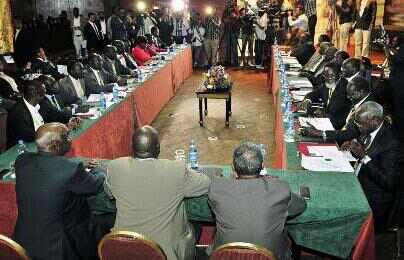IGAD to hold heads of state consultative meeting on South Sudan conflict
January 7, 2015 (JUBA) – The Intergovernmental Authority on Development (IGAD), which mediates South Sudan’s peace talks, said Wednesday it would hold heads of state consultative conference on the one-year conflict.

It remains unclear whether the new one would come out with practical plans to implement recommendations made from the previous meetings.
Speaking to reporters in Juba on Wednesday, Ethiopian foreign affairs minister, Tedros Adhanom Ghebreyesus, said the summit would take place on 18 January, adding he met with President Salva Kiir to extend him an invitation to attend it.
“I had a very fruitful discussion with his Excellency president Salva Kiir Mayardit. We had two issues: one is the upcoming IGAD summit in Addis Ababa in January 18, which he will be attending. The other issue which we discussed was the progress of the peace talks and also the preparations for the upcoming IGAD summit, Ethiopian foreign minister,” Ghebreyesus told reporters .
He expressed hope that the upcoming meeting would build on the progress made in the previous summits and break the deadlock on a number of outstanding issues the two sides are to resolve.
The Ethiopian minister said that during the last summit there was agreement on most of the issues and there were very few sticky issues after which a recess was given to the two parties who agreed to resume discussions on remaining issues after consulting with their constituencies.
“So we will start by listening to the report from their consultations, but as I said before, since there was agreement on most of the issues, we will build on the issues which were agreed previously,” he added.
South Sudanese foreign affairs and international cooperation minister Barnaba Marial Benjamin who attended the meeting with the president commended Kiir for extending warm discussion with the visiting Ethiopian foreign minister.
Benjamin stressed on the existing bilateral relations between the two countries and announced that joint ministerial commission will be held in February.
“There are some agreement(s) being drafted and we hope the next joint ministerial commission that will be held in Addis Ababa will take our bilateral relations to even higher level,” the minister said.
China and IGAD are also organizing a separate conference to be hosted by the Sudanese government in Khartoum on 12 January before the IGAD summit.
Sources told Sudan Tribune that Khartoum meeting was important in trying to forge an understanding as it will involve a country like China which has influence on president Kiir’s government, given that Beijing is the biggest oil dealer which provides 95% of the overall revenues to the young country.
Beijing also gives loans to president Kiir and provided him weaponry in June last year.
The oil also passes through the only pipeline in Sudan to the international market.
The Sudanese government also accuses Juba of harbouring and supporting its rebel groups as well as involving them in the war against opposition forces led by former vice-president, Riek Machar.
Juba also accuses Khartoum of training and arming Machar’s opposition forces.
South Sudanese rebels have been calling on Ugandan troops allied to president Kiir to withdraw from war and territory of the young country.
Analysts, however, say the upcoming IGAD summit would decide whether it should be the last chance to break the deadlock in the negotiations in which warring factions and their backers are more strained than ever, and proposing a reasonable compromise, under the threat of economic sanctions, could compel them finally to prioritise peace.
But many observers are skeptical and doubt of the two sides strike a deal to end the conflict. They point to the recent consultations the government held in Juba and the armed opposition under the leadership of the former vice president, Riek Machar, held in Pagak, saying it widened and hardened gaps instead of narrowing them.
(ST)
